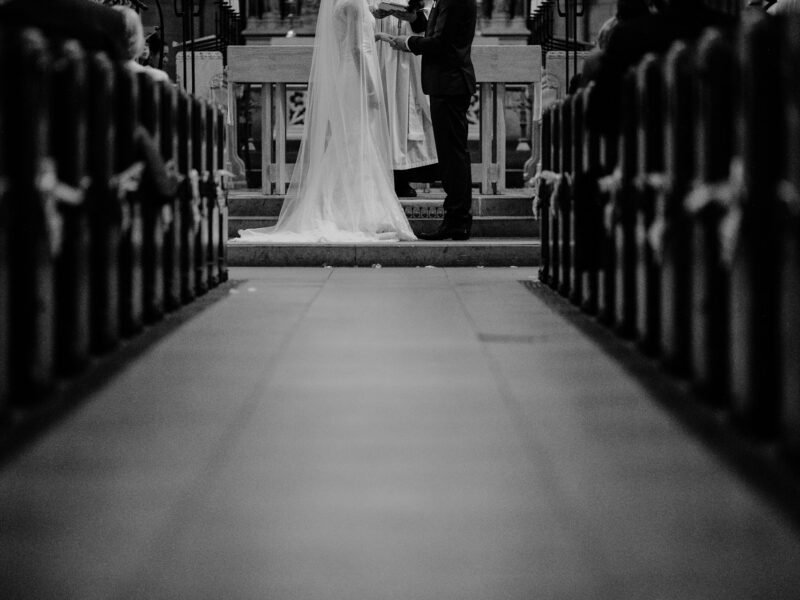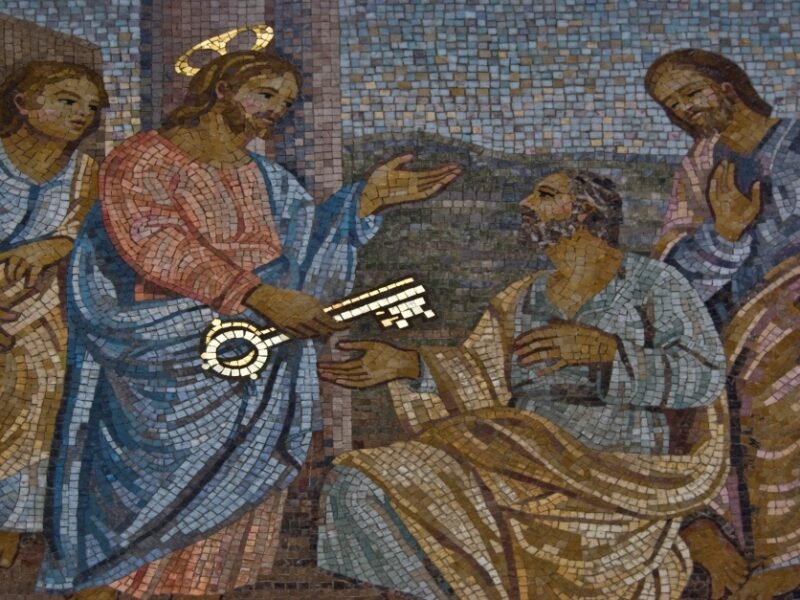P.D. James makes several morose references to the abandonment of the “old book” or “old liturgy” in the childless 2021 England of her dystopian novel The Children of Men (COM). By “old liturgy” she is referring to the 1662 Book of Common Prayer, a book containing a marriage rite which stresses procreation as the first “cause for which matrimony was ordained.” While we find ourselves possibly in a less dire situation than the world James imagines, we should examine whether we Anglicans do enough to emphasize the importance of procreation in marriage; we should consider the similarities between and the implications of the human behavior of her fictional, involuntarily infertile world and the real world of the past half-century in which married Christians have been taught, explicitly and implicitly, that there is nothing wrong with choosing to be childless if that makes us happy.
***
COM begins in the year 2021 with diary entries by the protagonist, an Oxford history professor named Theo Faron. Having completely and somewhat abruptly lost the ability to reproduce, the world welcomes what it assumes will be the final human generation in 1995, and it appropriately dubs this generation Omega. The Omegas have grown to adulthood and none of the males are producing fertile sperm; even sperm stored for fertility treatments has suddenly become useless.
A very striking passage comes early on when Theo describes how the world and he reacted to the acknowledgement of mankind’s fast-approaching extinction.
Western science has been our god. In the variety of its power it has preserved, comforted, healed, warmed, fed and entertained us and we have felt free to criticize and occasionally reject it as men have always rejected their gods, but in the knowledge that, despite our apostasy, this deity, our creature and our slave, would still provide for us; the anaesthetic for the pain, the spare heart, the new lung, the antibiotic, the moving wheels and the moving pictures. The light will always come on when we press the switch and if it doesn’t we can find out why. Science was never a subject I was at home with. I understood little of it at school and I understand little more now that I’m fifty. Yet it has been my god too, even if its achievements are incomprehensible to me, and I share the universal disillusionment of those whose god has died. I can clearly remember the confident words of one biologist spoken when it had finally become apparent that nowhere in the whole world was there a pregnant woman: “It may take us some time to discover the cause of this apparent universal infertility.” We have had twenty-five years and we no longer even expect to succeed. Like a lecherous stud suddenly stricken with impotence, we are humiliated at the very heart of our faith in ourselves. For all our knowledge, our intelligence, our power, we can no longer do what the animals do without thought. No wonder we both worship and resent them.
In an attempt to encourage copulation and potentially revive hope of the human race’s continuity, the government in COM sponsors “porn shops,” but finds that these efforts failed because people seemed to need “the assurance that they could have a child if they wanted.” Intercourse has become less frequent, and has deteriorated into, as Theo puts it “meaningless acrobatics.” Some who still desire an approximation of parenthood have resorted to treating pets as children, hosting Christenings for kittens dressed in white gowns and caps, and holding birthing parties when a new litter is born. For those who want a distraction more than a replacement, there is endless government-funded amusement: they can fill their days with golf, travel, and other means of enjoying and extending life. They no longer even take much interest in their government which has been placed into the hands of a five-person council headed by Theo’s cousin, Xan Lyppiat, the Warden of England. The Warden rose to power by promising “freedom from fear, freedom from want, and freedom from boredom”—a dramatically futureless platform.
The main focus of life in this world is present pleasure, and the burdens of caring for the elderly do not fit into that framework. Thus, the government appropriates what had been privately organized suicides into forcible and ritualized murders of the elderly held at regular intervals. The “Queitus” events are unopposed. Without a future, without the living God, and without an eternity, all that matters is now, and James so well illustrates this and the resulting despair in COM.
***
It would require great effort to deny the similarities between this fictional world devoid of procreation and our present world that largely marginalizes its importance. As in COM, we see the widespread exchange of any relationships that entail selflessness—whether with spouses, children, neighbors, or the elderly—in favor of relationships that benefit us but require little. This must partially drive pornography’s government-enabled popularity: a body on a screen demands nothing, and the use of that form of sexual satisfaction will never lead to more responsibility in the form of children. For the physical act of sexual intercourse, we have enlisted chemists to render the overwhelming majority of these unions fruitless to suit our personal life plans.
It is not surprising to see the culture at large promoting delayed childbearing, intentional childlessness, and unnecessary limitations on family size, but it is concerning that so many Christians condone these practices. We must ask ourselves what an intentional refusal to fulfill the Genesis procreation directive does to a Christian marriage and by expansion the church as a whole.
***
Sadly, there are circumstances of our fallen state which cause some couples to be infertile or leave them mourning the early deaths of children. Knowing this type of soul-wrenching pain only heightens one’s perception of the cosmic ingratitude of refusing the gift of children. If we unnecessarily delay or permanently excuse ourselves from childbearing to achieve educational, career, or experiential goals, we are signaling to ourselves, our spouses, our parishes, and the watching world that achievements and possessions are more important than fulfilling a directive of scripture to expand the kingdom of Christ or participating in the sanctification borne of parenthood. We deprive our marriages of the spectacular work the Holy Ghost does through dark, overwhelming nights spent soothing these tiny bearers of God’s image; through the detailed marital discussions of what we believe and what we will pass on to our children; through the awe-inspiring, everyday moments when we glimpse, though very imperfectly, how mightily God loves His own sons and daughters.
Losing this key component in marriage not only impoverishes the husband and wife. With fewer children wriggling in our pews, our parishioners have less motivation to bolster the infrastructure of faith and practice that define the Anglican Way. In COM, Theo once remarks on how the board of directors at Oxford decided not to maintain the historic, crumbling campus in light of humanity’s impending extinction; we must consider how well we can maintain our faith and tradition if there are fewer and fewer children to whom to pass it. Western fertility rates have dropped precipitously since the middle 20th century with hysterical fears about overpopulation and the rise of contraceptive drugs. Women in developed countries now average fewer than two children, whereas the average in 1950 was 4.7. Christians are largely participating in this staggering un-population, giving in to societal pressures.
It was during this same mid-century era that Paul VI, Bishop of Rome, penned Humanae Vitae. It’s not uncommon to hear Anglicans contend that our Roman Catholic cousins are too strict on this topic, but to do that denies our own heritage and teaching. One must ignore Augustine, who insisted procreation ranked as the primary purpose of marriage. One must also ignore Cranmer’s own marriage rite which follows the Augustinian construct of marriage being first for procreation, followed by the avoidance of sin, and finally, affection and companionship. Even Richard Hooker argued in his discussion of Cranmer’s matrimony liturgy that procreation is the main purpose of marriage.
In this world there can be no society durable otherwise than only by propagation. Albeit therefore single life be a thing more angelical and divine, yet sith [sic] the replenishing, first of earth with blessed inhabitants, and then of heaven with saints everlastingly praising God did depend upon conjunction of man and woman, he which made all things complete and perfect saw it could not be good to leave man without an helper unto the fore-alleged end. (Laws V. 73)
It’s encouraging to see the 2019 ACNA prayer book revive some of the procreation language of the 1662 marriage rite that was removed from the 1928, but across the spectrum of traditional Anglicanism we must be more focused on reversing the current acquiescence toward intentional childlessness. Our parishes should be bastions of family life. It is imperative we teach that for those called into matrimony, the highest purposes of that union are to grow in holiness together and expand the kingdom of Christ. Our parishes must truly support families by praying for them, by financially assisting them with birth and/or adoption costs, and by providing basic help for what can often be the tricky logistics of childcare. These systems need to be intrinsic to our parish cultures so that when married couples see how well families are nurtured, they are less frightened by the grandeur of potential parenthood and less likely to heed the cacophony telling them to wait until all their higher education is complete, their material desires attained, and all their dreams achieved. While there are licit reasons for delaying childbearing (poor health, for example), those reasons are the exception, and do not include things like the inability to buy a three-bedroom home. We must demonstrate that we trust God more than the money we amass to take care of our families.
***
Toward the middle of COM, Theo meets with his cousin Xan, the Warden of England. After discussing happy childhood memories, they turn to the topic of the aging. Xan says:
“Odd isn’t it? Almost the whole of modern medical research is dedicated to improving health in old age and extending the human life-span and we get more senility, not less. Extending it for what? We give them drugs to improve short-term memory, drugs to raise mood, drugs to increase appetite. They don’t need anything to make them sleep that’s all they do. What, I wonder, goes on in those senile minds during those long periods of half-consciousness. Memories, I suppose, prayers.”
Theo said: “One prayer. ‘That I may see my children’s children and peace upon Israel.’”
Everything has been provided for them. They need nothing. They should be happy. And yet, all that matters is Psalm 128, one of two psalms in the 1662 marriage rite.
1Blessed are all they that fear the Lord, and walk in his ways.
2 For thou shalt eat the labour of thine hands: O well is thee, and happy shalt thou be.
3 Thy wife shall be as the fruitful vine upon the walls of thine house;
4 Thy children like the olive-branches round about thy table.
5 Lo, thus shall the man be blessed that feareth the Lord.
6 The Lord from out of Sion shall so bless thee, that thou shalt see Jerusalem in prosperity all thy life long;
7 Yea that thou shalt see thy children’s children and peace upon Israel.
Children are always inconvenient; they are exhausting and unrelenting, and they wear us down. But by embracing the weakness incurred while caring for them we learn to lean more desperately on the mercy of God. We see more and more that we are not our own. In accepting God’s procreation directive for marriage we submit ourselves to His glorious will; we obey Him, and in that obedience find true happiness. So let us be fearlessly fruitful and stock the “earth with blessed inhabitants, and then…heaven with saints everlastingly praising God.”






'The Children of Men and the Old Prayer Book' have 2 comments
March 4, 2020 @ 2:05 pm Christopher Francis Cox
Great article! It’s scary how close our society is to dystopian novels like this, and I agree that people would invest more in their parishes if they saw more children in them. I think it’s something everyone subconsciously knows but doesn’t want to admit. Continuing parishes wouldn’t be Prayer Book burial societies if people saw that there was a future.
March 6, 2020 @ 8:32 am Cynthia Erlandson
Clear-eyed and thought-provoking.